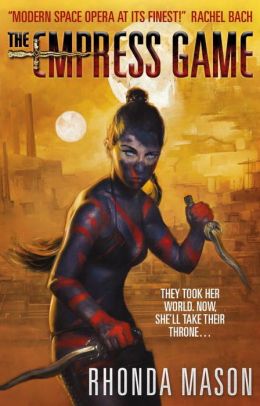I meant this post to have more than a single book in it. But it’s been a busy week, I’m behindhand in everything, and Rhonda Mason’s The Empress Game is a perfect example of an incredibly flawed book that nonetheless provides (or provides me, at least) a surprisingly satisfying reading experience.
I banged on a bit, last column, about being annoyed by the science fiction of nostalgia on display in Jane Lindskold’s Artemis Invaded and Margaret Fortune’s Nova. Mea culpa, mea maxima culpa: it turns out I’m not actually opposed to science fiction that harks back to the futures of yesteryear if it does other things that make me happy. Because Rhonda Mason’s science fiction debut—first in a projected trilogy—is unashamedly old-fashioned pulp space opera.
And damn, but I apparently have a soft spot as wide as the Irish Sea for pulp that doesn’t take itself too seriously.
Kayla Reunimon makes a living through brutal gladiatorial combat in an arena on a world that probably counts as a classic space opera “hive of scum and villainy.” She used to be an Ordochian princess, trained to protect her psychic twin, until an Imperial-supported coup overthrew her government and killed most of her family. She escaped with her last surviving younger brother, but without resources, they’ve been stranded, and Kayla has kept them safe and fed as best her training allows. But when a mysterious stranger approaches her with an offer she can’t refuse—an offer he won’t permit her to refuse—their precarious equilibrium is irretrievably altered. The stranger—Malkor—might offer them their best hope of survival, because their enemies are closing in.
Malkor wants Kayla to impersonate an Imperial dignitary. A princess, in point of fact. Because the Empire selects the spouse of its heir* by holding a martial tournament in which every woman of appropriate rank may compete for the honour of becoming the next Empress—and alongside that honour, claiming a seat on the seven-member Council that effectively rules the Empire. The princess Kayla is to impersonate is in on this scheme, as is the heir himself: they want to make a love-match, and they also believe they’re the best possible people to guide the Empire’s future—a future which might, if they get their way, involve withdrawing from the occupation of Kayla’s homeworld.
*Maybe just the spouse of its male heir? The case of the female heir is never discussed. Although it amuses me to imagine that the case of the female heir is exactly the same, down to the genders of the participants.
But there are complications. Like politics, sabotage, destructive nanoviruses, Dark Pasts, competing psychics, and the presence of the one man who can recognise Kayla for who she really is. Not to mention the small matter of needing to win the tournament itself.
This is a novel about fighting princesses. And family. But you pretty much had me at gladiatorial princesses. I’m not going to pretend this is particularly admirable of me, but I’m terribly afraid I like that trope far, far too much. I can forgive a novel a lot for combining angst and violence in an entertaining way, and The Empress Game does that.
It is also incredibly flawed. Kayla is the main character, but she is very rarely allowed to interact with other women as equals and allies: the novel passes the Bechdel Test, but not with flying colours. Compared to my favourite flavours of space operatic SF, it’s a touch patriarchal and very heteronormative. And, more annoyingly still, both heterosexual romances depicted in the reader’s view are poorly-fleshed-out: I can’t quite buy that the boys are anything worth getting worked up over, and the imperial heir comes across as a lot more of a nonentity than I suspect the narrative intends. The narrative structure is uneven, and the worldbuilding could be deeper and more well-thought.
All that aside— it entertained me remarkably well. Fighting princesses! I mean, come on. How can you expect me to resist?
Liz Bourke is a cranky person who reads books. Her blog. Her Twitter.










